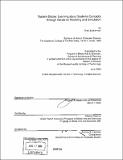| dc.contributor.advisor | Mitchel Resnick. | en_US |
| dc.contributor.author | Zuckerman, Oren | en_US |
| dc.contributor.other | Massachusetts Institute of Technology. Dept. of Architecture. Program in Media Arts and Sciences. | en_US |
| dc.date.accessioned | 2005-09-06T20:50:15Z | |
| dc.date.available | 2005-09-06T20:50:15Z | |
| dc.date.copyright | 2004 | en_US |
| dc.date.issued | 2004 | en_US |
| dc.identifier.uri | http://hdl.handle.net/1721.1/26922 | |
| dc.description | Thesis (S.M.)--Massachusetts Institute of Technology, School of Architecture and Planning, Program in Media Arts and Sciences, 2004. | en_US |
| dc.description | Includes bibliographical references (leaves 98-101). | en_US |
| dc.description.abstract | The world is complex and dynamic. Our lives and environment are constantly changing. We are surrounded by all types of interconnected, dynamic systems: ecosystems, financial markets, business processes, and social systems. Nevertheless, research has shown that people's understanding of dynamic behavior is extremely poor. In this thesis I present System Blocks, a new learning technology that facilitates hands-on modeling and simulation of dynamic behavior. System Blocks, by making processes visible and manipulable, can help people learn about the core concepts of systems. System Blocks provide multiple representations of system behavior (using lights, sounds, and graphs), in order to support multiple learning styles and more playful explorations of dynamic processes. I report on an exploratory study I conducted with ten 5th grade students and five preschool students. The students used System Blocks to model and simulate systems, and interacted with concepts that are traditionally considered "too hard" for pre-college students, such as net-flow dynamics and positive feedback. My findings suggest that using System Blocks as a modeling and simulation platform can provide students an opportunity to confront their misconceptions about dynamic behavior, and help students revise their mental models towards a deeper understanding of systems concepts. | en_US |
| dc.description.statementofresponsibility | by Oren Zuckerman. | en_US |
| dc.format.extent | 116 leaves | en_US |
| dc.format.extent | 5495069 bytes | |
| dc.format.extent | 5494877 bytes | |
| dc.format.mimetype | application/pdf | |
| dc.format.mimetype | application/pdf | |
| dc.language.iso | en_US | |
| dc.publisher | Massachusetts Institute of Technology | en_US |
| dc.rights | M.I.T. theses are protected by copyright. They may be viewed from this source for any purpose, but reproduction or distribution in any format is prohibited without written permission. See provided URL for inquiries about permission. | en_US |
| dc.rights.uri | http://dspace.mit.edu/handle/1721.1/7582 | |
| dc.subject | Architecture. Program in Media Arts and Sciences. | en_US |
| dc.title | System blocks : learning about systems concepts through hands-on modeling and simulation | en_US |
| dc.type | Thesis | en_US |
| dc.description.degree | S.M. | en_US |
| dc.contributor.department | Program in Media Arts and Sciences (Massachusetts Institute of Technology) | |
| dc.identifier.oclc | 56513237 | en_US |
